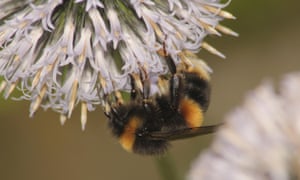Climate change putting UK wildlife 'increasingly at risk'
Climate change is already affecting UK nature, from seabirds to plants, with wildlife “increasingly at risk” as temperatures rise, conservationists have warned.
A report from the RSPB shows the impact that warming temperatures in Europe are having on birds, bees, butterflies and plants and the risks of future impacts from more extreme storms, loss of habitat and disruption between predators and prey.
The study shows that extreme weather such as heavy rainstorms, which is already becoming more frequent as a result of a warming world, hits species such as Scotland’s capercaillie and the cormorant-like seabird, the shag.
And with natural events in spring and summer occurring earlier, plants and different animal species are becoming out of sync, leading to concerns food will not be available when creatures need it.
In Scottish mountain habitats above the tree line, alpine plants have declined in recent decades, while generalist, lowland species have increased, the report showed.
Bird species associated with cooler climates, such as lapwings, are seeing numbers reduced, while those, such as bee-eaters which have recently been nesting in small numbers in the UK, that are adapted to warmer conditions, are faring better.
The UK has seen the first breeding records for cattle egrets, purple herons, and great white egrets, while regular breeding has begun here by little bitterns and attempts by black winged stilts.
The small red-eyed damselfly is another new colonist, arriving on the east coast of England in 1999.
With the march northwards in the face of rising temperatures, some species may lose some or most of their range and be forced into areas where there is no habitat for them – making the creation and protection of wildlife areas key, the report said.
With further unchecked climate change, a quarter of Europe’s butterfly speciescould lose more than 95% of their current range by 2080, and nearly four-fifths of species could lose more than half of the area where they are currently found.
The problem is also severe for bumblebees with a third of them facing the risk of losing more than 80% of their current range by the end of the century, the Nature Of Climate Change report by the RSPB said.
And research on 1,350 European plant species suggests a fifth could lose 80% of their range by 2080, and one in 50 species (2%) could become extinct altogether.
There are also worrying signals from Europe’s seas, where conditions are also changing the plankton, hitting the sand eels that feed on them and the kittiwakes which feed on the eels, contributing to a 70% decline in the seabirds in the UK in recent decades.
The report comes after a poll for the Energy and Climate Intelligence Unit suggests Britons are more worried about the impact of climate change on UK wildlife than any other aspect of the problem, with 79% citing it as a concern, compared to 72% worried about flooding and 50% about heat waves.
Martin Harper, RSPB’s director of conservation, said: “Climate change is the greatest long term threat to people and wildlife.
“We are already seeing its impacts, and, alongside other pressures on land and at sea, our wildlife is increasingly at risk.”


No comments:
Post a Comment